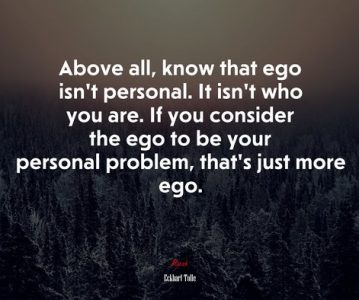In my usual habit of keeping things light, I’d like to talk about something which is present in every single one of us. A complex beast, often mentioned and rarely understood.
I’m talking about the ego.
Usually, when it’s brought to our attention, the conversation goes something like this: “Steve’s going off again. He really thinks he’s something special that one. He’s got a right ego on him.”
In truth, we’re speaking with some hypocrisy here, as it would have certainly been our own ego rushing in to make a judgement.
What does it all mean?
Much like the rest of western society, I consult Google to check out the definition of words I’m not completely sure about. Here, we get the following:
Ego: “A person’s sense of self-esteem or self-importance” – This explanation won’t surprise or enlighten many people.
However, two definitions immediately follow – adding context to the word. And they make things a whole lot more interesting (at least, they do if you’re me. Other modes of entertainment are available).
These other definitions excite me for a few reasons. Firstly, in case it was ever unclear, I’m a massive loser. Give me deeper meanings and more context and I’ll say “Yummy, more of that please, thank you very much”.
I love how broad these definitions are. They basically tell us that the ego is our ‘thinking’ self. That it shapes our perception of reality and makes us who we are. From the perspective of an individual, is there anything bigger than that? Worth also noting that Ego means “I” in Latin, which is probably what inspired Freud to use it in his psychoanalytical theories.
Why should anyone care?
How much time do you think the average person spends thinking about thinking?
Often, we accept our thoughts without question. We give so much weight to the voice in our head, we barely take a moment to consider that there may be another option. At least, not until someone else encourages us to think about how those thoughts may be impacting our lives. A concerned friend, for example. Or a mental health specialist.
I’m not a specialist but you can consider me a friend. And I’ve dealt with mental health in various forms, personal and interpersonal. And my experience tells me that the ego is responsible for more than just telling us that we’re better than other people. A lot more.
It’s also the thing that is responsible for self-criticism and insecurity. Our internal dialogue which can take the form of a critical parent. Left unchallenged, it can become crippling and debilitating. I know, because I’ve been there.
It’s the part of us that might become emotionally attached to an outcome or an idea. When it’s invested, it really wants to be right – and it will normally do what it can to prove that, even in the face of strong opposing evidence.
Don’t believe me? That’s fine. Share your experiences in the comments. It would be particularly good to know how many times you’ve walked away from a row on the internet having succeeded in changing someone else’s mind.
We live in interesting times. Everyone has a platform and plenty of people are talking. However, not many people seem to like listening. Those that do are mostly confined to their individual echo chambers. It’s the age of information and we’re mainly using it to confirm our existing beliefs and talk to ourselves. It doesn’t really seem sustainable.
We hear no end of people discussing how divided we are and saying that our standards of communication have declined. I don’t think that’s necessarily true. I’m not sure how many other people remember early internet, but I think we handle ourselves better online these days.
But with so much information out there, we’re learning a lot about the human condition. It’s revealing some harsh truths about us and the way we interact. But used well, it could also drive us forward.
The thing about getting to know your own ego is that you start to notice what’s going on with other people. And then you see egos battling egos and situations that cannot end in a way that can satisfy either party. It’s interesting, but there’s also a lesson in there. Something about energy management.
Basically, it’s not worth getting bogged down in lose-lose situations when there are so many better choices we can make. If we all tried to implement that rule, the internet could be a less polarising place.
